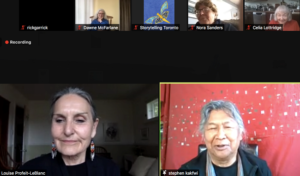Two friends come together to share stories and songs during Toronto Storytelling Festival

By Rick Garrick
TORONTO — Former Northwest Territories premier and Dene Nation National Chief Stephen Kakfwi was featured along with Nacho Nyak Dän storyteller Louise Profeit-LeBlanc on May 5 at the Toronto Storytelling Festival. Kakfwi and Profeit-LeBlanc shared stories and songs virtually during their A Conversation with Northerners session.
“I enjoyed it, I felt comfortable,” Kakfwi says. “It’s different to talk to a TV screen with people’s faces on it, but these are the times we’re in.”
Kakfwi says it was good to visit with Profeit-LeBlanc virtually during the session, noting he had not seen her for about 40 years.
“It’s been a good reunion,” Kakfwi says. “There’s always a kinship we have with people from the Mackenzie Valley, the Dene people have with all the different peoples in the Yukon. They’re just over the mountains so to speak.”
Kakfwi says he has realized that it is time to start sharing his stories now that he is 70-years-old.
“I’m trying to write the memories I have of the people and events and places I’ve been in my lifetime, starting from when I was a boy about four years old up until, I’m 70 now,” Kakfwi says. “I like to think I lived in interesting times with interesting people, so I want to start sharing that with the world. Storytelling is one way to do it and writing stories is another way to do it, so I’m trying to do both.”
Kakfwi says he shared a story that his grandfather’s father had told him, as well as two songs about the first sign of spring and his memories of moving to a traditional camp in the springtime.
“My father sang a song in 1975 and told a story as told to him by his father, called, The First Sign of Spring, celebrating when the snow starts to melt off the land,” Kakfwi says. “So we went from there and then we talked about how the land talks to you and the earth is alive, so that prompted another story about young people falling in love and how they communicate that to each other in those times.”
Profeit-LeBlanc says they had previously decided to do the A Conversation with Northerners session like two old friends having a conversation in a coffee shop.
“We were just sharing, and that’s the traditional way of storytelling, you know, when you meet your friend you’re just sharing stories, what’s happening in your life,” Profeit-LeBlanc says. “It’s not so much that it’s a performance at a storytelling festival, it was a conversation between two storytellers, one is a balladeer and he tells his stories and he sings his songs — it was beautiful. I was so happy that we just stuck to our guns and said this is how it’s going to happen.”
Profeit-LeBlanc says it is important to be involved with the Toronto Storytelling Festival because Indigenous people are the “first tellers” in Canada.
“There is a lot of important history, the language, the song, the places that have these wonderful stories attached to them,” Profeit-LeBlanc says. “Many of these stories are not written down, but there’s a huge canon of orature. And not only is it good for our own Indigenous communities, it’s good for the world. There’s so many teachings in these stories that people can’t get anywhere else.”
The Toronto Storytelling Festival is scheduled over the virtual Zoom platform from May 1-16 with about 21 visiting storytellers and about 58 local storytellers or groups. Information is posted online.

